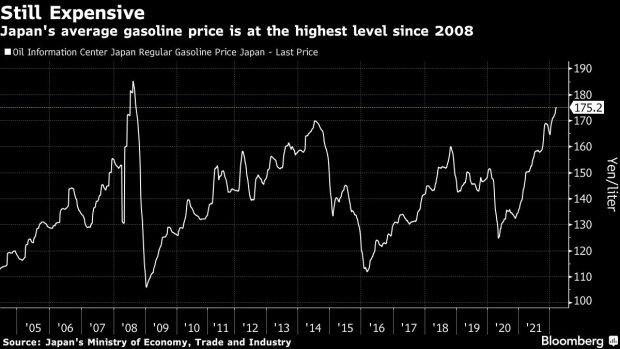Mar 16, 2022
Fuel Price Rally Forces Japan to Maximize Subsidies to Refiners
, Bloomberg News

(Bloomberg) -- Japan’s gasoline prices at the highest level in 13 years is forcing the government to give the maximum amount of subsidies for oil refiners and also consider measures to lower the nation’s gasoline tax.
The country’s average gasoline price was at 175.2 yen ($1.48) a liter on Monday, according to data released on Wednesday from the trade ministry. That’s the 10th consecutive week of gains, and the highest level since September 2008.
The government said it will pay out the maximum subsidy of 25 yen a liter for gasoline and other oil products from Thursday. Without subsidies, the trade ministry sees gasoline prices at 197.1 yen a liter next week. That would make it the most expensive on record, according to Bloomberg data going back to 2004.
The war in Ukraine has roiled commodities markets, heightening the challenges as Prime Minister Fumio Kishida’s administration grapples with inflationary pressures in everything from materials to basic food necessities. Kishida has lifted the gasoline subsidy from 5 yen a liter originally, and announced earlier this month an aid package to help people offset the rising costs of crude oil.
Related story: Hidden Inflation Bubbles Up From the Japanese Energy Market
The government’s measures so far have done little to curb the rally in gasoline prices. But as calls grow louder for additional measures beyond subsidies, Kishida and his ruling Liberal Democratic Party are expected to reactive a “trigger clause” on the gasoline tax that would allow for the levy to be lowered, according to local newspaper Yomiuri. But a recent slump in overseas oil prices may temporarily curb gasoline’s gains and take pressure off the government.
Other countries are also moving to ease gasoline taxes, with New Zealand and Sweden this month announcing temporary cuts to levies on fuel.
©2022 Bloomberg L.P.








